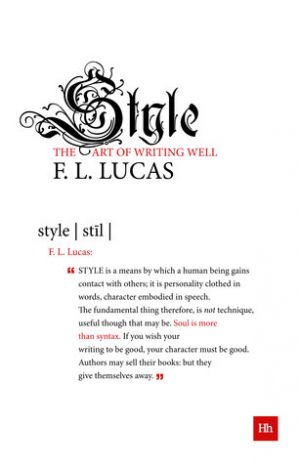
Style comprises eleven lectures, first delivered at Cambridge and then rewritten. It is a considerable book. Its author is the
British scholar F.L. Lucas (1894?1967), and his theme is style itself, specically style and language. It is not comprehensive
in the manner of Fowler?s Modern English Usage (a book he praises). ?I have merely tried, successfully or not, to pursue the
more general, more positive, but more elusive question?what are the qualities that endow language, spoken or written, with
persuasiveness or power?? And his more immediate topics are daunting in themselves. As he himself classies them, they
include brevity, character, clarity, emphasis, gaiety, inspiration, metaphor, methods, metre, process, simile, sincerity, urbanity, vitality, word order, and what Lucas calls ?good humour,? ?good sense,? and ?good health.?
Lucas is cogent and discursive, practical and witty, and thorough and distinctive. His knowledge astonishes. e index
provides 280 names, generally European writers, and selected, in a manner fairly comprehensive, from the ancient, Medieval, Renaissance, and modern periods (and several names in the text are in fact skipped). Lucas? command of history, geography, politics, society, war, and even Asian literature, all of which he incorporates, would intimidate anybody. He provides so many clever sentences that it has proved impossible to decide the best ones to quote. His commentary delights. ?You may remember how when Wilkes was canvassing the electors of Middlesex, some sturdy citizen growled, ?Vote for you, Sir! I?d sooner vote for the Devil? and how Wilkes smilingly rejoined, ?But in case your friend should not stand?? No wonder he was elected.?
Style challenges our assumptions about English. In high school, we were admonished not to weaken the strength of
our writing through the rst person qualier (e.g., ?in my opinion?). Lucas retorts: ?Actually it is far more modest (and often more truthful) to say ?I cannot admire this poem? than to say ?is poem is worthless? with the assurance of a President of Immortals conducting the Last Judgement.? Lucas on word order: ?For us, the most emphatic point in clause or sentence is the end?that last word continues, as it were, to reverberate in the reader?s mind. It has, in fact, the last word.? ?is advice,? wrote Joseph Epstein in the June 2011 issue of the New Criterion, ?also reinstates and gives new life to the old schoolmarmish rule about not ending a sentence with a preposition, for a preposition is almost never a strong word.?
Epstein?s article is important here. It is through this essay?in fact, a review of Stanley Fish?s How to Write a Sentence and
How to Read One?that Lucas swum into my line of vision. I was not alone in this. Writing one year later in the New English
Review, Matthew Walther records that, upon reading Epstein?s article, he, too, started to hunt for a copy of Style. According to
Walther, an editor at Harriman House also discovered Style through Epstein?s review. Because of that editor, the publisher has
now reissued the book. It had been out of print since 1974.
Like Walther, I am puzzled by Lucas? general lack of fame. Lucas moved in the Bloomsbury group. Leonard Bast mentions
him by name in Howards End. A friend was Lawrence of Arabia. Virginia Woolf knew him personally; in her diary she called
Lucas ?a bony rosy little austere priest,? one who worked ?like a miner,? and, who, in one conversation, ?sliced English literature
up very prettily, with a pocket knife.? His other books included anthologies, journals, novels, short story collections, poetry,
translations, essays, and at least one book of political science. Take a look at the book records for Lucas in the Library of
Congress catalogue?all 87 of them.
Because of its content, Style reminds me of Cyril Connolly?s classic Enemies of Promise. But I nd Lucas? work weightier than
Connolly?s. Lucas? footnotes, most of them descriptive, are often long and dense, and are used throughout. (One page has seven, another eight.) e frequency hurts the ow?but, as Lucas himself writes of Gibbon?s e Decline and Fall of the Roman
Empire, there would be no fun without the footnotes. Lucas only rarely translates his foreign language quotations into English.
e reader is thus expected to know German, Greek, Italian, Latin, and, in particular, French (an untranslated quotation
from Anatole France runs three pages. According to Walther, the new edition mercifully adds translations.). Less of a problem is
the quantity of the quotations. ough carefully chosen, there are, nevertheless, perhaps too many of them. And, surprisingly,
Lucas? own style is, at times, a bit clotted, too dense. Woolf called him ?not, after all, a born writer??unfair, possibly; but
some of his own stylistic problems he could likely have avoided.
But the boat still sails. In English one of the best short essays on style will stay the late Mavis Gallant?s What Is Style?
E.B. White?s An Approach to Style and Jacques Barzun?s The Retort Circumstantial each remain smart, practical, eloquent.
A collection I recommend is Barzun?s A Word or Two Before You Go; an anthology, John Metcalf and Tim Struthers? How
Stories Mean. But for a solid book by a single author I have put Style on my nearest shelf, and I would like to make the honest
(not deant) challenge to any reader to knock it down.